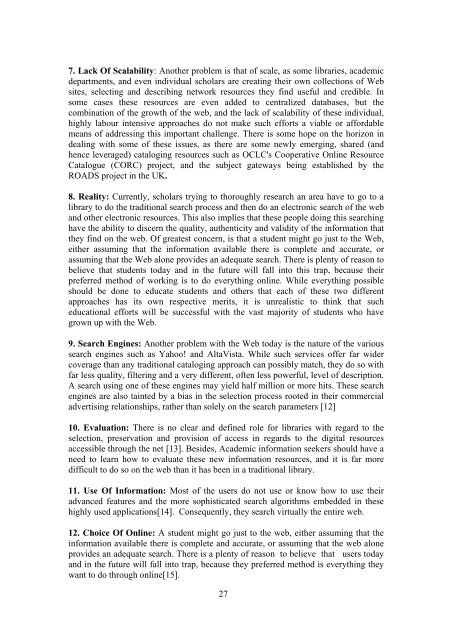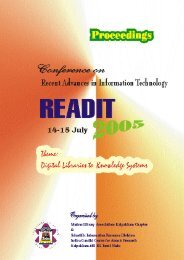READIT-2007 - Indira Gandhi Centre for Atomic Research
READIT-2007 - Indira Gandhi Centre for Atomic Research
READIT-2007 - Indira Gandhi Centre for Atomic Research
Create successful ePaper yourself
Turn your PDF publications into a flip-book with our unique Google optimized e-Paper software.
7. Lack Of Scalability: Another problem is that of scale, as some libraries, academic<br />
departments, and even individual scholars are creating their own collections of Web<br />
sites, selecting and describing network resources they find useful and credible. In<br />
some cases these resources are even added to centralized databases, but the<br />
combination of the growth of the web, and the lack of scalability of these individual,<br />
highly labour intensive approaches do not make such ef<strong>for</strong>ts a viable or af<strong>for</strong>dable<br />
means of addressing this important challenge. There is some hope on the horizon in<br />
dealing with some of these issues, as there are some newly emerging, shared (and<br />
hence leveraged) cataloging resources such as OCLC's Cooperative Online Resource<br />
Catalogue (CORC) project, and the subject gateways being established by the<br />
ROADS project in the UK.<br />
8. Reality: Currently, scholars trying to thoroughly research an area have to go to a<br />
library to do the traditional search process and then do an electronic search of the web<br />
and other electronic resources. This also implies that these people doing this searching<br />
have the ability to discern the quality, authenticity and validity of the in<strong>for</strong>mation that<br />
they find on the web. Of greatest concern, is that a student might go just to the Web,<br />
either assuming that the in<strong>for</strong>mation available there is complete and accurate, or<br />
assuming that the Web alone provides an adequate search. There is plenty of reason to<br />
believe that students today and in the future will fall into this trap, because their<br />
preferred method of working is to do everything online. While everything possible<br />
should be done to educate students and others that each of these two different<br />
approaches has its own respective merits, it is unrealistic to think that such<br />
educational ef<strong>for</strong>ts will be successful with the vast majority of students who have<br />
grown up with the Web.<br />
9. Search Engines: Another problem with the Web today is the nature of the various<br />
search engines such as Yahoo! and AltaVista. While such services offer far wider<br />
coverage than any traditional cataloging approach can possibly match, they do so with<br />
far less quality, filtering and a very different, often less powerful, level of description.<br />
A search using one of these engines may yield half million or more hits. These search<br />
engines are also tainted by a bias in the selection process rooted in their commercial<br />
advertising relationships, rather than solely on the search parameters [12]<br />
10. Evaluation: There is no clear and defined role <strong>for</strong> libraries with regard to the<br />
selection, preservation and provision of access in regards to the digital resources<br />
accessible through the net [13]. Besides, Academic in<strong>for</strong>mation seekers should have a<br />
need to learn how to evaluate these new in<strong>for</strong>mation resources, and it is far more<br />
difficult to do so on the web than it has been in a traditional library.<br />
11. Use Of In<strong>for</strong>mation: Most of the users do not use or know how to use their<br />
advanced features and the more sophisticated search algorithms embedded in these<br />
highly used applications[14]. Consequently, they search virtually the entire web.<br />
12. Choice Of Online: A student might go just to the web, either assuming that the<br />
in<strong>for</strong>mation available there is complete and accurate, or assuming that the web alone<br />
provides an adequate search. There is a plenty of reason to believe that users today<br />
and in the future will fall into trap, because they preferred method is everything they<br />
want to do through online[15].<br />
27

















